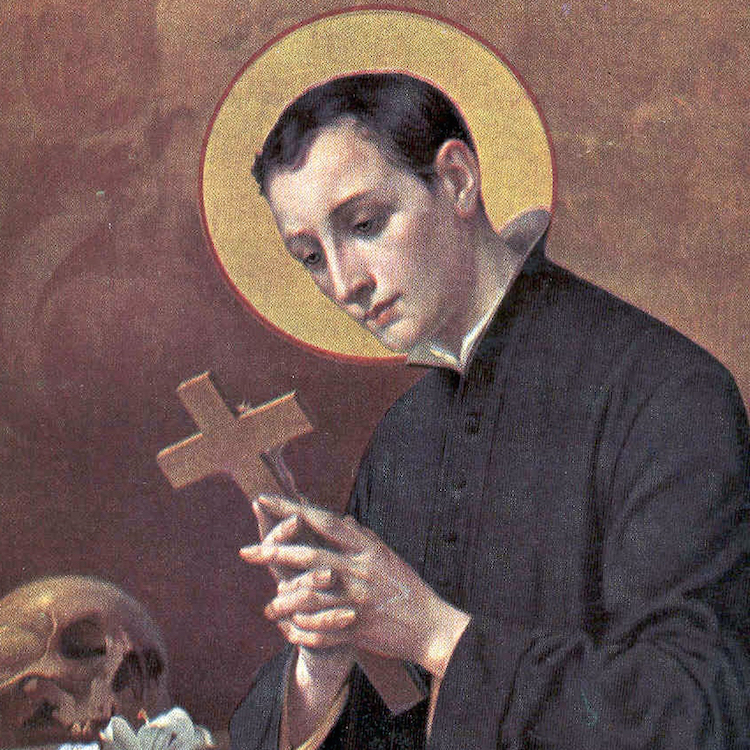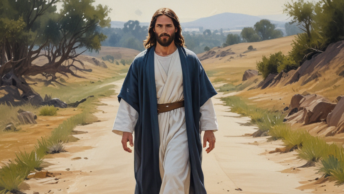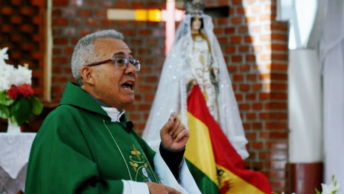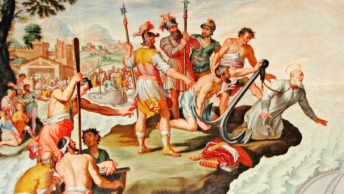Back in the 1930s, a young man who was exploring the French Alps came upon a very ugly, desolate stretch of land. He was about to leave when he noticed an old man, bent over with a sack of acorns on his back and an iron pipe in his hand. The man was using the pipe to punch holes in the ground, and in each hole he planted an acorn. When the traveler asked him what he was doing, the old man explained that, ever since his wife died, he wanted to do something useful. “I’ve planted over 100,000 acorns,” he said; “perhaps only 10% of them will grow, but it’s still worth trying.” The young traveler didn’t think much of the idea, but he was polite enough to keep his doubts to himself. However, twenty-five years later he returned to the exact same spot, but it was no longer desolate; instead, it was covered by a beautiful forest two miles wide and five miles long, teeming with birds and animals and wildflowers (Link, Illustrated Sunday Homilies, Year A, Series I, p. 64).
One person—an old man—working alone, brought about a lasting change for the better; the world was a richer and more beautiful place through his efforts. The same thing is meant to be true as a result of our faith. Our good deeds, whether done publicly or privately, can be like seeds or acorns; they can take root and become a source of blessing for many people. We might object, “Planting trees is one thing, but improving people’s lives is much harder—especially in today’s sinful and violent world. What can I or any other person accomplish working alone? Little or nothing.” That’s true—but we’re not alone. The man planting acorns really wasn’t by himself; God was with him, providing the rain and sunlight and time which made possible a beautiful forest. In the same way, when we try to do what’s right, we’re not alone; God provides His Spirit to encourage and guide and assist us. Through the power of the Holy Spirit, our efforts to do good can make a difference.
Jesus Christ is the most important and influential person Who ever lived—not only because He is the only person Who also has a divine nature, and not only because He established the Church, and not only because He alone can save us from our sins. Another important and unique feature about Jesus is that He alone—almost 2000 years after His death—continues to live in the world and in the hearts of His followers. Hundreds of millions of people today continue to honor the memory of Confucius, Buddha, and Mohammed and try to live by their teachings and example— but these men are dead and no longer present in this world. Jesus, however, is alive, and has sent His Spirit to dwell in us and transform us here and now, allowing us to make a difference. The readings for Pentecost show that not only does the Holy Spirit call us to ministry and the sharing of the Gospel; we are also made capable of living out our faith and serving others. Until the day of Pentecost the apostles were in hiding; they were afraid of the authorities and unsure of their own mission. Upon receiving the Holy Spirit, however, they were transformed; they were suddenly capable of preaching boldly and being understood by everyone. God brought this about, and the apostles cooperated, allowing the newly-born Church to make the first of its many converts. God’s Spirit gives authority to the Church; as the Gospel shows, this authority is to be used to benefit others. Jesus gave the apostles His Spirit, and then immediately told them to forgive sins, bringing peace and reconciliation to a sinful world. Only through the Holy Spirit is such a thing possible. As St. Paul reminds us, it is through this same Spirit that we believe in Jesus and have membership in His Church. Through baptism and confirmation we receive the Holy Spirit, and we’re given both the opportunity and the ability to live out our faith.
The world today needs people of faith; it needs us—even though there are times we feel we haven’t much to offer. If I were to ask, “How many of you have had days when you were miserable or tired or cranky or depressed, days when you felt you were of no use to anyone— yourself included—days when you wished you hadn’t gotten out of bed in the morning?,” I’d bet almost everyone here would raise his or her hand. If I were then to ask, “How many of you have completely and permanently given up on life and wish you had never been born?,” I’d expect and hope no one would raise a hand. What makes the difference? How do we cope, and continue to find meaning in life, in spite of our worries and problems and fears? Through the power of the Holy Spirit.
I know from my own experience that God’s Spirit is active among us. On some days it’s easier to be a priest and minister to those in need than on others. I’ve discovered that some of my most effective ministering occurred when I felt I had little to give, when I honestly didn’t know what to say, or on days when it was an effort just to go through the motions. Thus, whatever good that happened certainly wasn’t from me; it was from the Holy Spirit. The same can be—and probably already is—true for all of us. We’re not aware of all the good we accomplish; the Holy Spirit can give greater meaning than we would ever expect to our simple efforts to live out our faith, whether it be our helping hand to someone in need, our efforts to set a good example, or our friendly word or encouraging smile. These and other seeds of faith can be like acorns planted in desolate ground; we ourselves may never see the results, but our willingness to follow Jesus can help change the world. As Christians, we are called to minister to others, as Our Lord did—and through the Holy Spirit, our efforts can make a difference.








